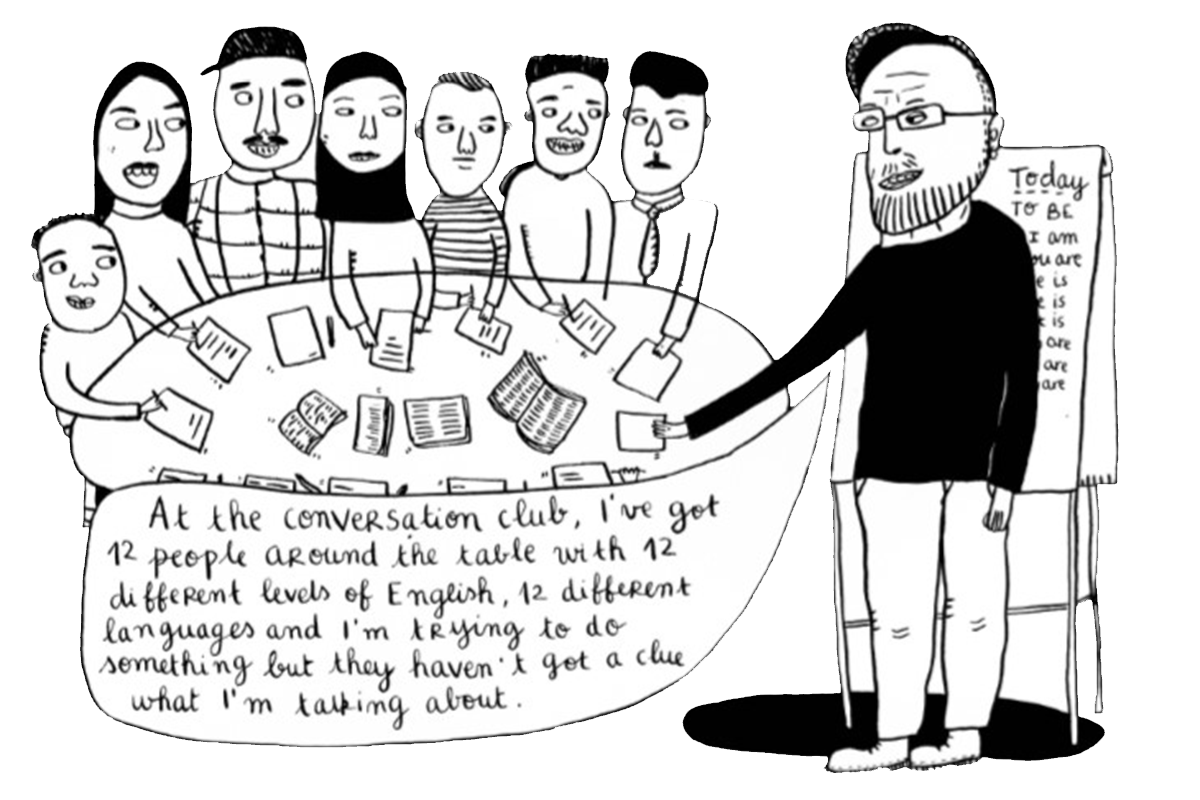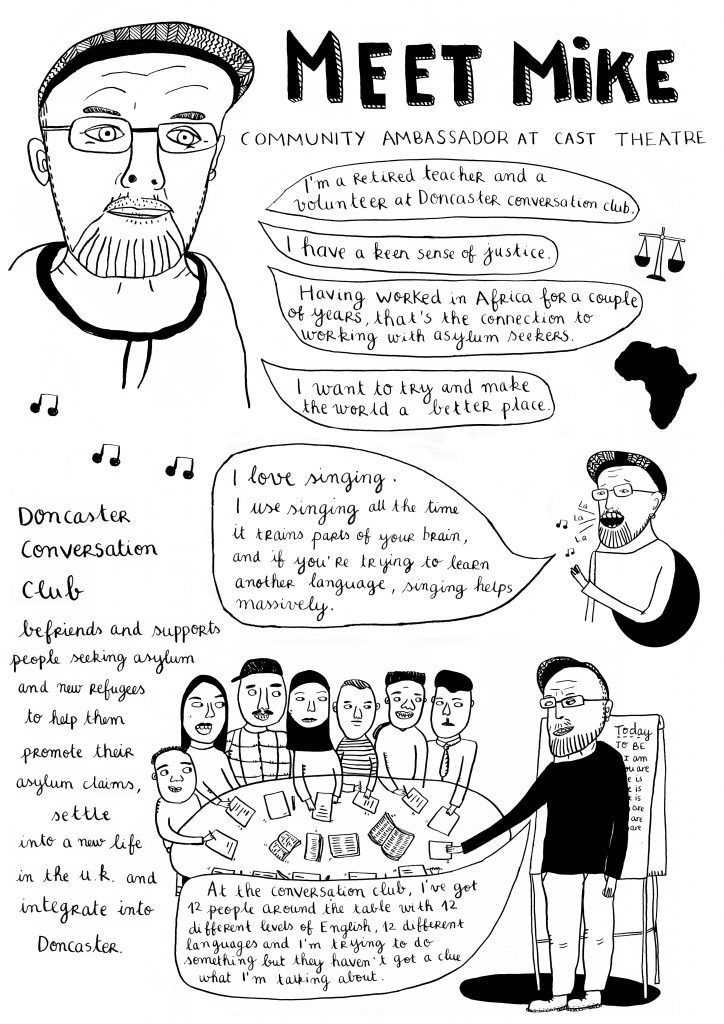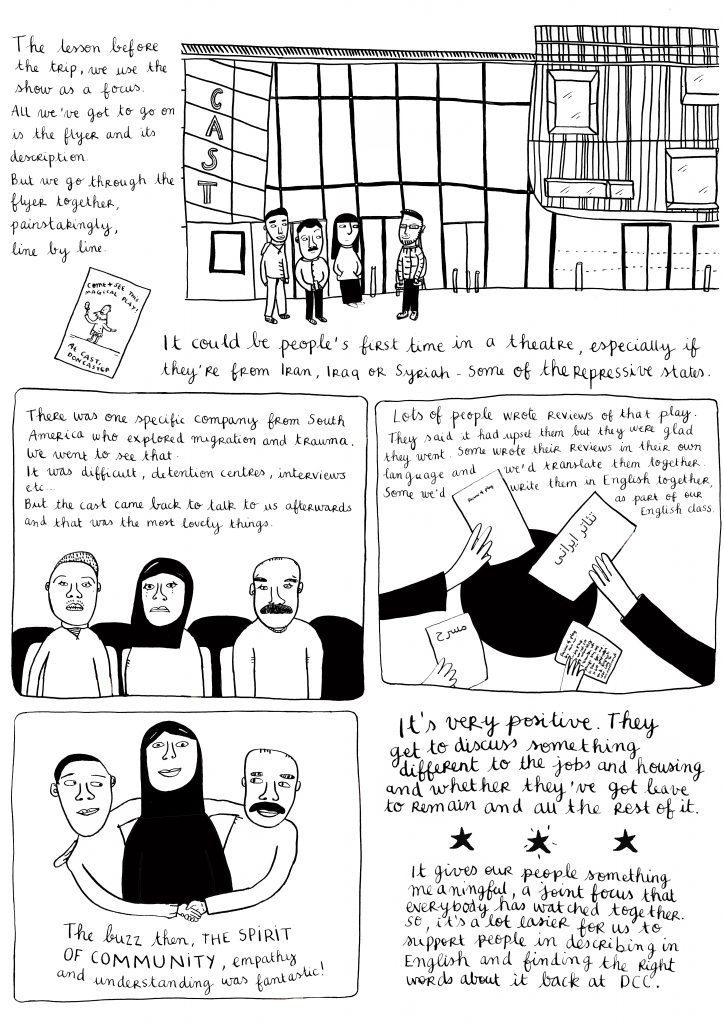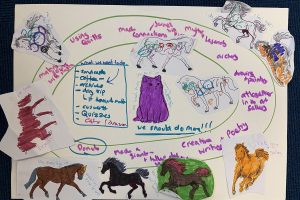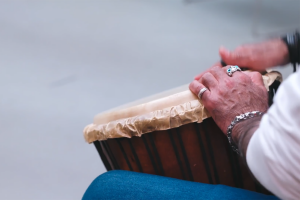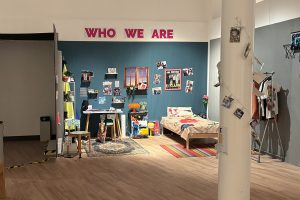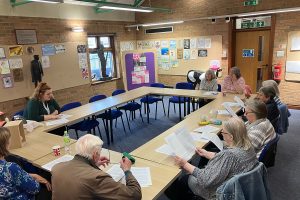Written by Emilie Taylor
Cast Community Ambassador programme was initially piloted in 2024, and for the next two years through the UKRI Creative Health Boards project, with the aim to empower Cast’s culturally engaged participants to become Community Ambassadors. Through the programme they create facilitated bridges into their communities, that remove barriers to attendance and create a culture of enabling. The programme encourages a kinder, more supported engagement with Cast, looking at first-time attenders. We are currently working with three Ambassadors connected to the Conversation Club focussing on people with refugee status and people seeking asylum, people from the Global Majority, and people with lived experience of ill health and disability.
Reflections on the Role of Theatre Trips in Supporting People Seeking Asylum after studying the Ambassador Scheme at Cast, Doncaster
‘Societies benefit from framed rituals which channel potentially unmanageable feelings … this is an ancient solution and a way of acknowledging beyond human control’ (Joy Schaverien, Psycoanalyst,1991).
‘I want to express my deepest gratitude for the unforgettable experience you gifted me that night. The performance went far beyond acting—it was a profound, living poem that stirred every fibre of my being’ (Arad, Iranian Asylum Seeker Doncaster, 2025).
Reflections on the Ambassador programme at CAST Theatre in Doncaster have helped me to understand what theatre can contribute to the mental health of the refugee and asylum-seeking population attending.
I have used oral accounts from recorded interviews with Mike, (a volunteer Ambassador bringing people from Doncaster Conversation Club), and illustrations created through collaboration with Mike and Graphic Artist Elodie Ginsbourg, (using Mikes words). In combination with theory from Psychoanalysis, evidence about mental health within the migrant population and accounts from those attending performances, to reflect on the potential of theatre to impact on health outcomes.
Two key benefits have come to light – the potentially therapeutic role of the theatre for individual and group mental health amongst populations who have experienced trauma as part of forced migration, and the role that theatre trips can play in contributing to the success of learning English as a second language.
Warmth, respite and a way to pass the time might have been my first thoughts of what a theatre trip could offer people seeking asylum. Potentially all these things are true. But as I am now learning the theatre has offered the people making these trips chance to experience a deeper connection as a community gathered through shared experience, a way to process emotion about the past, and a rare opportunity to be present in the moment – all difficult things to achieve in the daily fight for survival.
Bilal, a Palestinian man seeking asylum in Doncaster, wrote down his feelings after attending the dance performance ‘Now’ by Jasmin Vardamon Company, (a piece exploring issues of migration and the impact of alienation):
‘As an asylum seeker, I found the experience profoundly meaningful. It reminded me that pain and beauty often exist side by side, and that art can communicate across all cultures and backgrounds…
I found myself completely drawn in, connecting emotionally to the story being performed on stage. It reminded me that even in silence, we can still be seen and understood. The show sparked something positive in me: a sense of hope, expression, and connection that can be hard to find in daily life when you’re in a difficult or uncertain situation.
I left the theatre feeling lighter, inspired, and grateful.’
Connection, emotional processing and being in the moment are important aspects of emotional wellbeing that could potentially contribute to tackling some of the migrant mental health concerns outlined in The Mental Health of Asylum Seekers and Refugees in the UK Report, 2024, (Mental Health Foundation, 2024).
Experiences of poverty, financial insecurity, unemployment, lack of adequate housing, social isolation, loneliness, prejudice, stigma, and discrimination all carry a higher risk of poor mental health [10], and asylum seekers and refugees are at higher risk of experiencing all these inequalities. (Mental Health Foundation, 2024).
We know from Home Office figures that 537 asylum seekers were supported by the local authority in Doncaster in the last quarter of 2024, with 129 of those people living in hotel accommodation. Twenty one people living in Doncaster have been given refugee status since 2014 (https://www.migrationyorkshire.org.uk/statistics/refugee-and-asylum-seeker-dashboard).
In her essay ‘The Picture in the Frame’ Jungian Psychoanalyst Joy Schaverien uses the historical context of the altar or tabernacle and the scapegoat ritual to provide ancient context for our need to come together in societal groups, reflect and expend collective energy, and how this can help release overwhelming feelings.
She explains that as the community come together within the church to focus attention on the altar, so we also come together within the frame of the theatre or the gallery with the shared focus of the artwork or the stage. She takes great care to describe how each of these spaces in their structure, environment and social and behavioural codes are different – spaces ‘set apart’. Knowing these places are separate to everyday life can enable a feeling of safety in the release of emotion there, keeping boundaries and held apart from a life, or lives, where there might not be space for releasing such feelings of magnitude.
This is useful for the individual as a process of release or meditative self-reflection, but also of huge benefit to communities in developing coherence and for individuals to feel part of their community:
‘Like the temple where the scapegoat ritual is enacted, the theatre, the art gallery and the art therapy session have certain features in common. They all have an inner framed experience, which is dependent on the boundaries of the outer frame to contain the experience within the collective energy is directed to this one point and the collective gaze is held by the common investment in the altar and the action. The protagonists in the drama are the channel through which the community is purged… It is the pivot, the centre from which potential chaos is channelled into a manageable form and so contained’ (Schaverien, 1991).
These ideas correspond with Mikes observations about the benefits of the theatre trips for his community. Here he describes a visit to see ‘Kin’ a physical theatre performance by Gecko, written about the Artistic Director’s family’s experience of forced migration from Yemen. (Illustrated below by Elodie Ginsbourg using Mikes words).
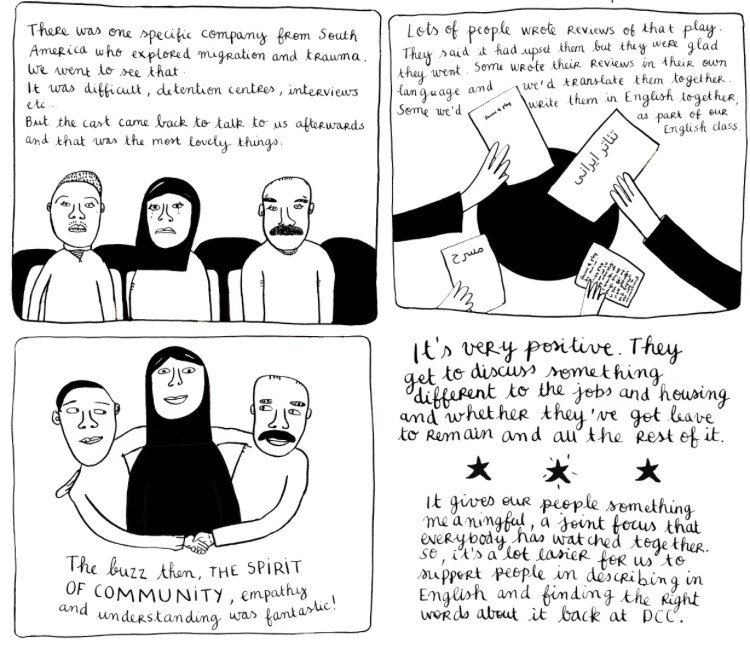
In Mikes account we see that as well as the therapeutic benefit of experiencing the show people had a desire to write and to communicate their feelings about what they had seen, as we have seen in Bilal and Arad’s accounts.
The Mental Health of Asylum Seekers and Refugees in the UK Report has a dedicated section for Language Proficiency, due to its impact on feelings of social isolation and their effect on mental health. The report states:
‘Difficulties with speaking and understanding English can affect the formation of social connections, employment, and accessing or engaging with vital services including healthcare, education, and legal advice. The inability to speak English is one of the reasons for feelings of loneliness and isolation amongst asylum seekers and refugees.‘ (Mental Health Foundation, 2024).
Mike has been clear that attending the trips has helped to strengthen the teaching and learning of English as a foreign language back at Conversation Club. He has described the difficulties in motivating large groups and being understood by everyone in the weekly classes, (see illustration 2) But, as we see in the above account, having the shared focus of the play gave context and excitement to both the lesson before, (translating the programme guide about the performance), and to the following lesson where people were keen to review and comment on what they had experienced.
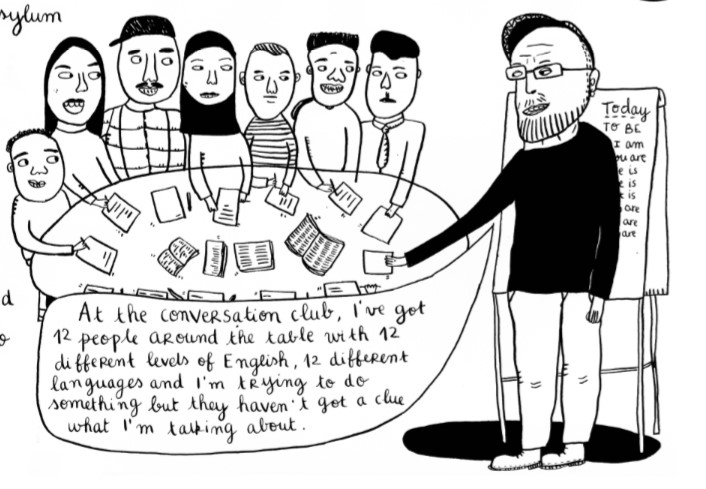
‘The theatre trips give a focus and people are motivated to learn about what they are going to see, and then to come back and review the show and discuss it with their peers.’ – Mike
Currently the Ambassador Scheme continues to be successful in bringing people seeking asylum into the theatre. Last week I attended a performance of ‘Cinderella Ice cream Seller’ with 20 Kurdish women and their children. This success is driven by the skill of Cast Community Engagement Manager Nic Doyle in selecting Ambassadors with lived experience of gaining health benefits from the theatre and who have connections into communities previously underrepresented at Cast, and by the enthusiasm and dedication of those volunteers.
The learning about benefits for mental health and language through theatre for this specific group could inform development of future programmes at Cast and in other theatres and help access different funding streams for this work in the future.
However, it is important to be mindful when working with people who have experienced trauma of the implications for participant and practitioner wellbeing. The Creative Health Quality Framework recommends practitioners should be trauma informed, (having attended specific training), when supporting people experiencing mental health difficulties.
‘Asylum seekers and refugees are at particular risk of mental health problems. These may develop as a reult of their experiences in their countries of origin, during their journeys, or after they arrive in the UK.’ (Mental Health Foundation, 2024).
It is therefore important to be mindful of equipping staff properly to support this group as this work progresses, particularly if their experience of theatre or their writing may release some memories and emotion connected to their past.
“I feel happy and peaceful now”. (Zehra, Kurdish Asylum Seeker, Doncaster after watching ‘Now’).
References
Schaverien, J. ‘The Picture Within the Frame’ in The Revealing Image; Analytical Art Psychotherapy in Theory and Practice, 1991, London & New York: Routledge
The Mental Health of Asylum Seekers and Refugees in the UK Report, Mental Health Foundation 2024
Asylum Seeker Dashboard https://www.migrationyorkshire.org.uk/statistics/refugee-and-asylum-seeker-dashboard
Creative Health Quality Framework https://www.culturehealthandwellbeing.org.uk/resources/creative-health-quality-framework
